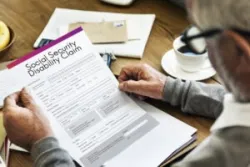
You can get approved for disability before your hearing, although the specifics of your case can affect if you can achieve this outcome. A pre-hearing approval can reduce the time you have to wait for benefits, which means you could get them faster.
However, many disability claims require a hearing for various reasons. If your case requires a hearing or you want to know how you can move your case along, you can meet with a Greenville Social Security Disability lawyer from Pilzer Klein to learn about your options. We can tell you the benefits you qualify for and how we can handle your case during a free consultation.
When Is Receiving SSDI Approval Before a Hearing Possible?
Applicants may be able to avoid a formal hearing for Social Security Disability Insurance benefits in the following situations:
- Initial application approval: If the initial application provides strong evidence and meets the qualifying criteria for disability, the Social Security Administration (SSA) or other relevant agencies may approve the application without a hearing.
- Quick disability determinations (QDD): SSA uses an advanced computer screening model to identify cases where a favorable disability decision is likely and medical evidence is available to support that decision. The agency processes QDD-qualifying cases quickly, sometimes without requiring a hearing.
- Compassionate allowances (CAL): This initiative identifies claims from applicants with serious diseases or medical conditions so severe that they meet disability standards without the need for a hearing. CAL cases are often accelerated and can receive approval quickly.
- On-the-record (OTR) decisions: In some cases, an attorney or representative can request an OTR decision if the case’s evidence supports a disability claim. An Administrative Law Judge (ALJ) may issue a favorable decision based on the written medical record alone, which allows the applicant to bypass a hearing.
- Reconsideration: Before a case goes to a hearing, it may be reviewed during the reconsideration phase, followed by a second review of the initial application by different SSA personnel. If the reconsideration results in an approval based on new or more complete medical evidence, a hearing might not be necessary.
Have You Been Injured In An Accident? Contact Pilzer Klein Law
864-235-0234Medical Evidence Plays an Important Role in Disability Cases
The most straightforward way to get approved for a disability before your hearing is to provide comprehensive medical evidence on your application. This evidence should clearly demonstrate the severity of the disability and how it meets the Social Security Administration’s (SSA) definition of disability.
Generally, medical evidence for a Social Security Disability Insurance (SSDI) claim should include any information that helps the SSA understand your condition and how it affects your ability to work. You should include detailed medical records from all healthcare professionals who have treated you, doctor’s statements or reports, and medical test results.
If you receive treatment from specialists (e.g., cardiologists, psychiatrists), include their evaluations of your condition. These can provide more depth about specific aspects of your condition. You can include personal statements and statements from family, friends, and coworkers that describe how your condition affects your daily life.
What Happens if You Must Have a Social Security Disability Hearing?
If your case does not get approved before a disability hearing, you can request a hearing before an ALJ. This stage comes after the SSA denies the initial application, and the application is unsuccessful in the reconsideration stage.
You must request a hearing within 60 days of receiving a denial of your reconsideration request. After you submit it, you will receive a notice of when the hearing will take place at an Office of Hearing Operations (OHO) in your area. The SSA will hold the hearing to determine if your medical condition is severe enough to keep you from working and earning gainful employment.
What Is the SSD Hearing Process Like?
You may wonder what happens at a Social Security Disability hearing. The proceeding can take place in a small conference room and follows a structured process, although it is usually less formal than a court trial. You and a Social Security disability lawyer or representative will meet with the ALJ, a court reporter, and possibly a vocational expert (VE) or medical expert (ME) called by the SSA.
You and your witnesses will have to testify under oath. The ALJ will ask you questions, and your legal representative can also ask questions. If a VE or ME is present, they will provide expert testimony on your ability to work, given your condition.
After the hearing, the ALJ will review the evidence and testimonies before deciding if you have a disability per SSA’s criteria. It can be intimidating to attend a disability hearing or handle this challenging process by yourself. Hiring a Social Security Disability applications lawyer from our law firm can lead your case for you, making it easier to manage.
Contact our social security disability lawyers today
864-235-0234How Social Security Disability Lawyers Can Help With a Hearing
A Social Security Disability (SSD) lawyer from Pilzer Klein can play a critical role in helping you through the hearing process. Our attorneys have handled many cases for disability applicants throughout North Carolina and South Carolina and hold deep knowledge about SSA regulations that can help you navigate the nuances of disability law.
If you hire us to represent you, we can:
- Gather evidence to show the severity of your disability. This includes your medical records, statements from treating physicians, and other critical documents. We will ensure your evidence is complete and submit it to the SSA in a timely manner.
- Submit a pre-hearing brief to the ALJ. This brief will summarize your case, outline the evidence, and argue why the evidence supports a finding of disability that meets the SSA’s definition.
- Develop a case strategy that addresses the specifics of your situation. We will focus on the strongest arguments for your claim.
- Represent you at the hearing. This includes presenting your case and arguing for your claim and challenging adverse evidence.
Working with our firm’s attorneys means you can prepare for a hearing beforehand. We can help you anticipate questions the ALJ may ask at the disability hearing. These include questions about your medical condition, treatments, and limitations and how they affect your everyday life and ability to work.
After a hearing, we will explain the ALJ’s decision, what it means, and how to move forward. If the decision is unfavorable, our lawyers can consider appealing your case.
Complete a Free Case Evaluation form now
Contact UsCall Today About a Disability Benefits Hearing – Free Consultation
Getting approved for disability before your hearing is the ideal outcome. It reduces the wait time to receive SSDI or supplemental security income (SSI) benefits and the stress and uncertainty of waiting to hear about an application’s status. Despite these advantages, securing approval without a hearing is not always possible, especially in complex cases or those lacking sufficient medical evidence.
Pilzer Klein can help you explore your options for receiving disability benefits before or after the hearing stage. We will give you straightforward guidance and explain how our 50-plus years of combined experience can guide your claim. Call us today for a free consultation.
Call or text 864-235-0234 or complete a Free Case Evaluation form







